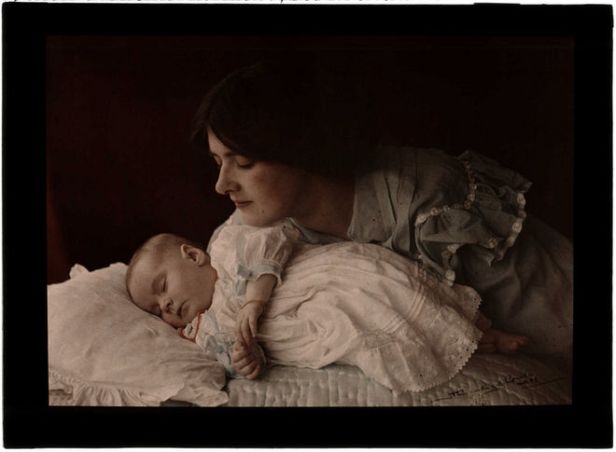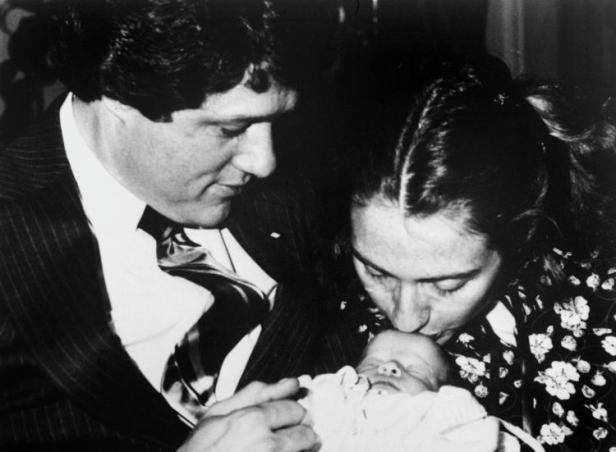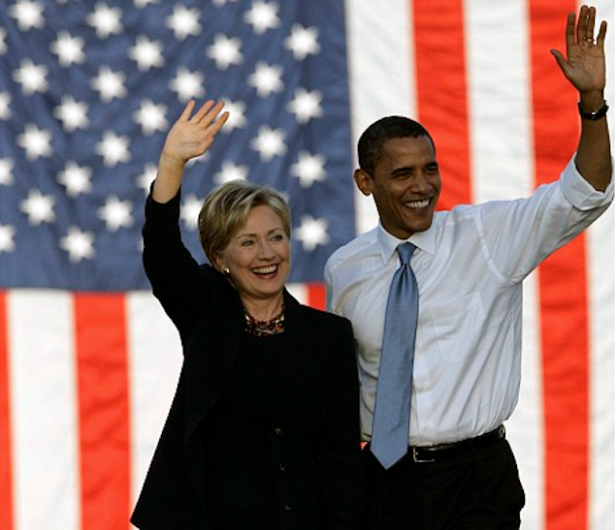What can studying Hillary Clinton at this particular moment, particularly in the wake of her loss, teach us about her rhetoric–in particular her use of motherhood as a rhetorical strategy?
The essential question resides in the “Catch-22” of motherhood. Does (or did?) Hillary Clinton evoking motherhood as a rhetorical strategy make her stronger or weaker as a candidate?

Clinton wanted to be the nation’s president, not its mother, yet even in her heartbreaking concession speech, she evokes a motherly tone as she emboldens this passionate maternal plea to all young girls:
“And to all the young girls out there who are watching–never doubt that you are valuable and powerful and deserving of every chance and opportunity in the world to pursue and achieve your dreams.”
This quote historically places her a far cry away from the moment described in the Humans of New York post about her experience taking her admissions test for law school. Classmate BrieDanielle sheds light on Hillary revealing what the men in the room were saying:
“ a group of men began to yell things like: ‘You don’t need to be here.’ And ‘There’s plenty else you can do.’”
Presumably referring to her being a woman and a woman’s place being in the house and the home–not becoming a candidate for law school, which would ironically launch the beginning of her storied career in politics.
BrieDanielle continues the conversation focusing on the patriarchal rhetoric used by the men in that room explaining: “Hillary was told that she was undeserving because she was a woman and women had better things to do and her future was not as important as those men taking the test” evoking the traditional social construct of motherhood–get married and start a family (oh, and if you have time, run for president too!)
My classmate pushes the conversation further arguing that Hillary is saying these are learned gender biases and challenges us to think of some gendered biases that we feel we have or were forced to learn. To this I would add that motherhood is a gender bias that we are forced to adhere to and which perpetuates the “catch-22” of motherhood–you can’t be accomplished and be a mother–but if you are a mother–you’d better be an accomplished one. Be a mother, but not a working mother, because then you couldn’t possibly be a good mother. And beings that you aren’t working in the “real” world, be prepared to be marginalized and your work devalued. And finally, if you are a working mother –and indeed one running for president–you had better summons motherhood as part of your rhetoric to prove that you can, and better, have it all. The catch-22 is real.
What no one seems to be talking about is that men in the political arena are rarely questioned in this way about balancing fatherhood and their career aspirations. Rarely does a man hear that working full time makes him a negligent father. This rhetorical silence leaves a place for researchers to enter in analyzing the evocation of fatherhood in the rhetoric of male political candidates.

Society’s idea of what the perfect mother looks like — a fantasy maternal figure–distorts the perception of the first woman who could have become president. It affected Clinton’s likeability and relatability thus forcing her to consistently reference her motherhood and obsess over her personality traits rather than focusing on the abilities and experience she had to bring to the presidency. This served to perpetuate the idea that women are judged based on their capacity to nurture and be kind.
And regardless of what Clinton accomplished on behalf of children and families (all motherhood issues), she was continually branded a cold, calculating, ambitious non- relatable who avoided what society constructs to be a woman’s greatest vocation in life — to be a mother, a nurturer, a homemaker.
How can we stop perpetuating a culture where a woman’s value is determined by how motherly she is perceived to be?
Hillary Clinton wanted to be the President of the United States, not our mother. She was the most qualified, capable and experienced candidate to run for office ever. The only person she needed to mother was her daughter — and she did a fine job of that….
Hillary is the subject of Bill Clinton’s introductory speech at the DNC in which he uses the rhetoric of motherhood to glorify and make her more relatable launching a virtual mother lode of motherhood:
“My daughter had the best mother in the world.” … “Hillary first and foremost was a mother” … “She did all this while being a fulltime worker, a mother and enjoying life.”…“When Chelsea speaks tomorrow night, you’ll see that Hillary has done a fine job of being a mother”
My take on this is that just as Hillary Clinton recalled motherhood to win voter support, so too does Bill grow that mother lode in his references to her as a matriarch –5 times in the first 25 minutes of the speech to be exact–even at the expense of demeaning his own fatherhood.
Juliacanzoneri adds to this discourse suggesting that Bill’s rhetoric follows a more feminine style of speaking as he evokes for the audience an image of a woman who is both hardworking and compassionate in her support of her husband and her devotion to her daughter, all the while dedicating her life to public advocacy.
Adelakolenovic maintains:
“She is masculine enough to have the credentials and ability to take on the presidency and feminine enough to be the “mother figure” who knows exactly what this nation needs.”
Pmurphy54 argues that Hillary is often thought of as too methodical and points out that this creates a conundrum for her leaving her in the trap of having to evoke motherhood as a means to an end and in a twist suggests that referring to Hillary’s motherhood is actually more legitimate for some to hear coming from Bill.
Sarahparente furthers this view adding that from a rhetorical standpoint, having Bill echo motherhood was actually a really effective strategy clarifying: “What is important is that Bill Clinton’s focus was on Hillary’s political achievements, and he did not let her role as mother take center focus.”
In weaving the conversation together, the overarching theme is that evoking motherhood in tandem with accomplishments results in strategically appearing to be able to do it all — certainly a respectable quality any president should possess.

What people are not saying is how important is being “with child” or “with family” in achieving high political office? Could a bachelor ever rise to the position? Could a single childless woman? What would be the stigmas, if any attached? Who would have better odds of winning?
Posing such questions validates Clinton’s need to evoke motherhood to strengthen her rhetoric.
In her exploration of the role of value and belief in Clinton’s candidacy, sarahparente’s annotations of Hillary’s DNC speech takes the conversation further as they reveal that Hillary’s use of the rhetoric of motherhood appeals to voters who hold strong beliefs and values with respect to family and children. Her argument cedes that when Clinton feels that her audience, her voters, value a woman’s role “as mother” in this area, she is willing to speak in support of such a role. She continues to assert that Clinton evokes motherhood, and indeed, even grandmotherhood, in her speech as a strong appeal to voters in regards to family values, maintaining weight both personally and with her female audience.
It is my view that in order to really know the character of a candidate, we need to look at the causes they gravitated toward before they entered the political arena. At what they chose to champion despite the demands of political life. For Clinton, that has always been kids.
Which leads us to a gap in the conversation. To what people are not talking about…
How does the male audience respond to Clinton’s rhetoric of motherhood and her emphasizing the matriarchal theme throughout her candidacy. Does it appeal to the male audience?
Or does it have the reverse effect? Do men still think women should be at home in more traditional roles raising their families away from the glass ceiling altogether?

What role, if any, have former first ladies played in the shattering of the glass ceiling?
Rhetoricians have pondered the rise of the rhetorical first lady as sarahpuente points out in her post explaining that by contextualizing the role of the first ladies we can more fully understand the rhetorical limitations they faced and the barriers they broke within a very gendered sphere of domesticity. She begs us to consider how Hillary’s talk of motherhood in her rhetoric continued this role and urges us to consider how it may have worked to avoid it.
My own view aligns in that it is also my hope that as women we can agree to not feel the need to abandon traditional roles in an attempt to escape the female sphere and on our own ascent of the ladder of success towards, and ultimately through, the glass ceiling.
It seems only fitting then, to look at the context of Clinton through the eyes of current First Lady Michelle Obama. In nonzamo’s post , she takes interest in how both Hillary Clinton and Michelle Obama have been characterized believing that Obama’s role as a great mother, a champion of healthy eating for the nation’s children, and a dedicated wife, actually shifted attention away from her intelligence and life accomplishments. Juliacanzoneri continues the dialogue hoping that our society moves towards an emphasis on women’s intelligence. And away, I would add, from the themes and social constructs of gender roles and motherhood.
Motherhood and the first lady — what will that look like for Melania? Will she need to evoke motherhood to make her more relatable or will she follow in the footsteps of Jackie Kennedy and reminisce style, wealth, poise and grace instead? Will this leave her intellect downplayed?
Where might this conversation be going? What overall characterization can we make about how the topic of motherhood has been addressed?
Petscortnyc steers us confidently in a new direction referencing Barack Obama evoking an ethos of fatherhood in his paternal speech on the election results. “We’ve talked often about motherhood in our discussions,” he says, “and yet, in Obama’s speech I felt a paternal underpinning–a fathering the nation in a sense through what is for so many, a difficult pill to swallow.”
I am left intrigued. In the wake of the settling dust of a presidential campaign marked by an unusually high standard of political rhetoric, it is worthy to note that Obama chose to evoke a paternal tone reminiscent of the magnificence of the rhetorical legacy of our “Founding Fathers.” Rarely have we considered the power of fatherhood as a rhetorical strategy in the political sphere and this may be an area for rhetoricians to explore further.

“I am proud of her. A lot of Americans look up to her. Her candidacy and nomination was historic and sends a message to our daughters all across the country that they can achieve at the highest levels of politics.” –Barack Obama
PHOTO CREDITS: via google images unless otherwise noted

Hi buffington36,
1) To answer your question, “How does the male audience respond to Clinton’s rhetoric of motherhood…Does it appeal to the male audience?” I can only recall Bill’s teary-eyed reaction to her DNC speech where she referred to herself as a daughter, mother, and grandmother. Not sure how else you could gauge the responses of the wider male audience other than taking a very close look at the video coverage. Video annotations, perhaps?
Or maybe you could investigate the rhetorical silence you mention here: “Rarely does a man hear that working full time makes him a negligent father. This rhetorical silence leaves a place for researchers to enter in analyzing the evocation of fatherhood in the rhetoric of male political candidates.” How does the absence of male containment rhetoric influence the speeches of male politicians when they evoke fatherhood? Because we’re talking about speeches, I’m thinking of a traditional paper format, but I’m sure you can think of more creative, possibly visual, approaches, esp. if you’re going for a lesson plan.
OR you could go further with the Founding Fathers rhetoric–how has this legacy influenced the aforementioned speeches? More room for visuals/side-by-side comparisons if you go this route.
2) Previously I had only thought of listening and silence as female rhetorical strategies; your post makes me want to look into how male politicians use these strategies.
3) We learned that Clinton’s public perception has always been tied, if tangentially, to motherhood and the welfare of women and children. Her daughter Chelsea has presented herself as an exemplary public figure (see her recent interview with Seth Meyers) and she is now a mother herself who seems to be following in Hillary’s footsteps by stressing the importance of early education. Both are women who “have it all,” which seems great but also alienates large swaths of female voters, as rgelmosner discusses in her synthesis.
LikeLike